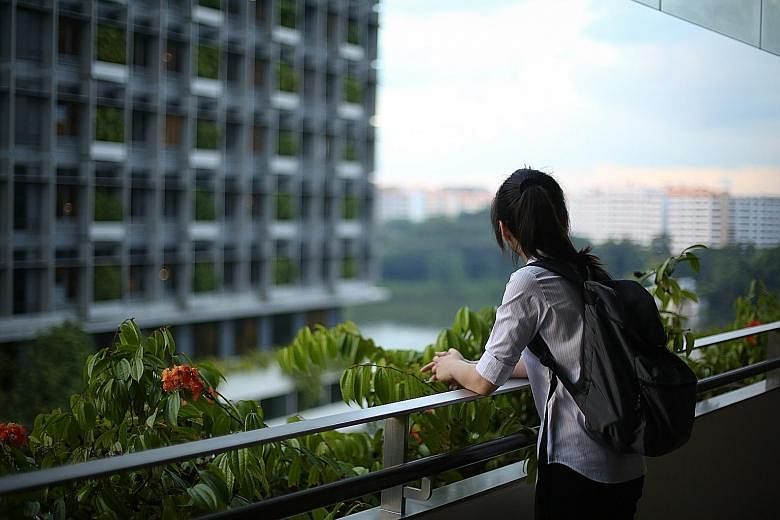For most people, detecting diabetes is a relatively straightforward matter of taking a blood test. But for Ms Tan, 23, it took a genetic test to confirm that she has diabetes.
She does not have type 1, type 2 or gestational diabetes, but a separate and almost unknown type called monogenic diabetes.
Ms Tan, who declined to reveal her full name, is among an estimated 2,500 to 5,000 people here with monogenic diabetes. This is based on the prevalence of those afflicted in other populations, such as in Britain.
To better understand this rare form of diabetes, a group of physicians, nurses and scientists from Khoo Teck Puat Hospital (KTPH) has started a registry of patients found to have the disease, also known as maturity-onset diabetes of the young (Mody).
This will help patients afflicted with it, as monogenic diabetics may not respond well to traditional diabetes treatments, they say.
Caused by a gene abnormality, the condition often remains undiagnosed till adulthood. Genetic testing is the only method to accurately detect monogenic diabetes.
While monogenic diabetes usually causes a reduced ability to produce insulin - a hormone that regulates blood sugar levels - the affected people do not usually have risk factors that are common with standard diabetes, such as high blood pressure.
-
What is monogenic diabetes?
-
Monogenic diabetes, also known as maturity-onset diabetes of the young (Mody), is a rare form of diabetes estimated to afflict about 1 per cent of those with diabetes.
People with this type of diabetes often show signs and symptoms before they are 25 years old and have a strong family history of diabetes. They are usually not obese.
There are different types of Mody, each with its own set of symptoms and treatment.
Sometimes it is enough to control it by managing one's diet, though some patients may need to take medication.
Monogenic diabetes can be detected only by genetic screening because many of its symptoms are similar to those of type 1 and type 2 diabetes.
So patients can be misdiagnosed, leading to unnecessary treatment like insulin injections, which can become costly in the long run.
Even if a patient with Mody does not respond well to treatment typically prescribed for type 1 or type 2 diabetes, doctors may not immediately suspect monogenic diabetes as there could be other factors that affect the patient's response to treatment.
Diabetes afflicts one in nine Singaporeans, among the highest rates in the world. It has prompted Health Minister Gan Kim Yong to declare a "war against diabetes" in 2015.
Said Associate Professor Lim Su Chi, senior consultant at the diabetes centre of KTPH and Admiralty Medical Centre: "While we're having this war against diabetes, we have this very niche subset population who have very special needs, which requires very specific treatments, which means that the right patient is given the right treatment at the right time."
Dr Ang Su Fen, KTPH's senior research officer, said the registry began in April. There are now about 35 people on it.
The KTPH clinicians behind the registry, which is supported by
by Alexandra Health Fund, said that the initiative will benefit patients in several ways.
First, this would allow them to know exactly what type of Mody they have and prevent them from taking ineffective treatment meant for type 1 or type 2 diabetics.
It will also help in providing relevant counselling to these patients and their family members.
Also, by tracking these patients throughout their lives, doctors with this information can tailor treatments for specific complications that may arise for each of them.
The hospital in Yishun is currently focusing on testing suspected Mody sufferers in northern Singapore, including Yishun, Woodlands and parts of Sembawang.
But the hospital will not turn away people from other parts of Singapore who want to test for monogenic diabetes, said Prof Lim.
Two other places that test for monogenic diabetes are National University Hospital and Singapore General Hospital (SGH).
SGH also has its own database of Mody patients, started in 2013, with around 30 patients on it so far.
Dr Daphne Gardner, a consultant at SGH's department of endocrinology, said that the hospital runs a bi-weekly clinic for the assessment, diagnosis and management of monogenic diabetes.
Eventually, it hopes to expand its database nationwide. Dr Gardner also said that SGH is open to collaborating with KTPH in the future.
In Ms Tan's case, she first detected something amiss two years ago during a pre-employment health check-up for a job in the uniformed services.
Then, her fasting blood glucose exceeded the normal range. Coupled with her family history of diabetes - her mother had gestational diabetes, followed by type 2 - she went for genetic testing.
Now, the civil servant watches her diet and eats smaller meals to keep her blood sugar level in check. She said: "With my usual positive outlook in life, I believe that having diabetes will not deter me from doing things that I like."
Correction note: A previous version of this story said that the registry was supported by National Healthcare Group. This is incorrect. It is supported by Alexandra Health Fund. We are sorry for the error.


